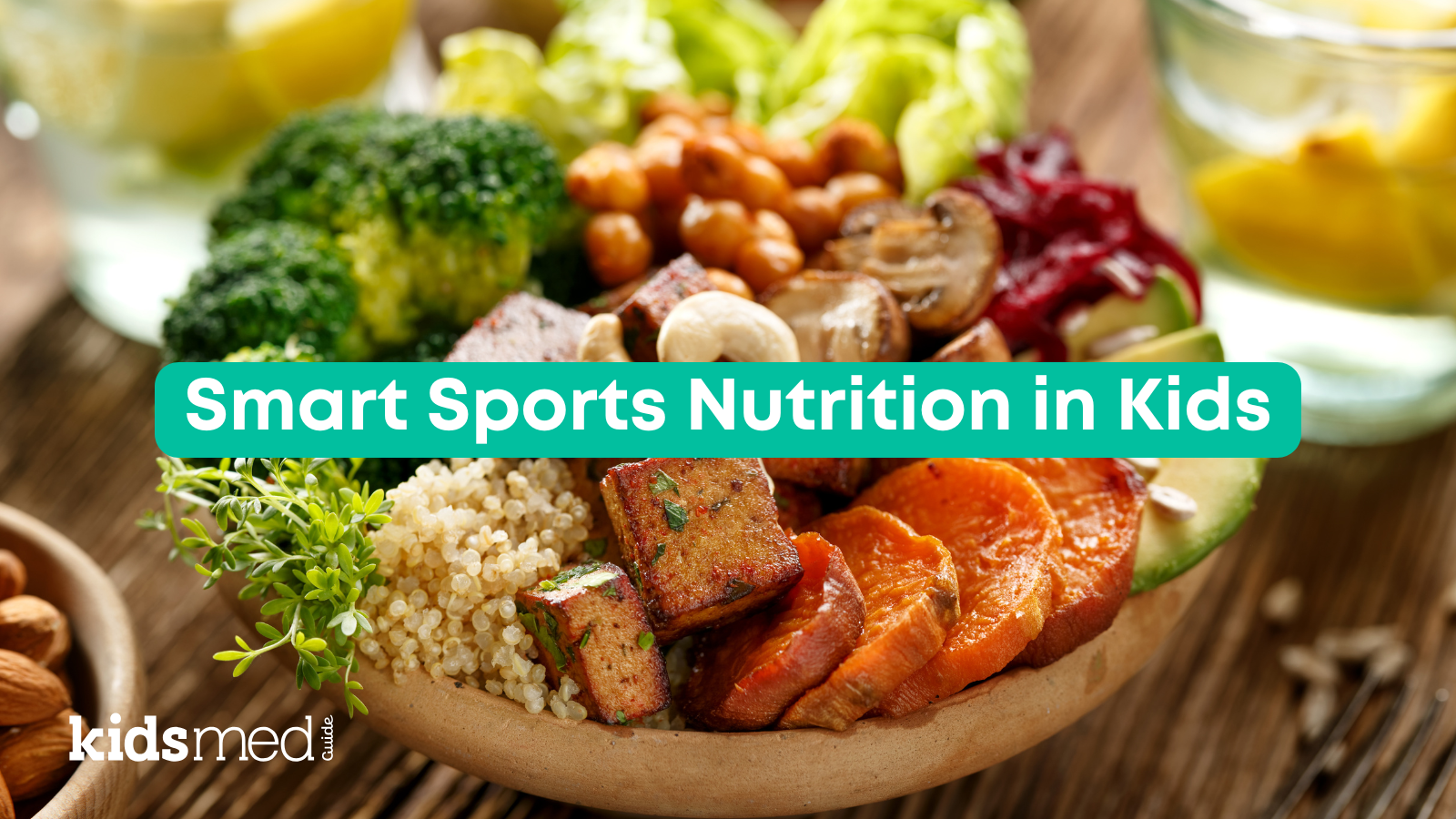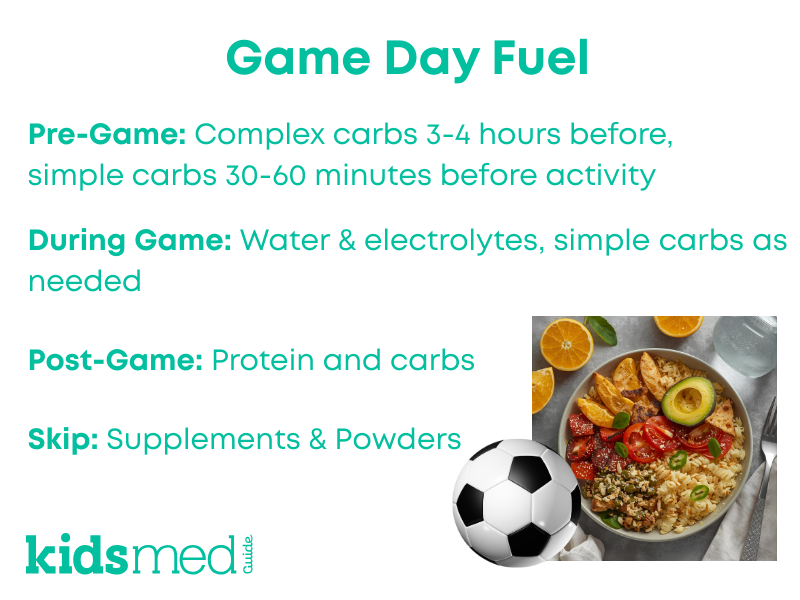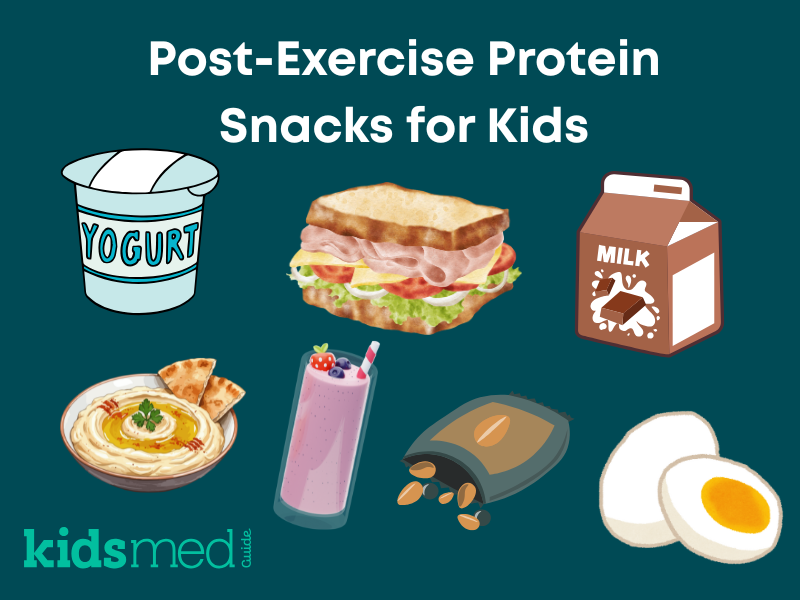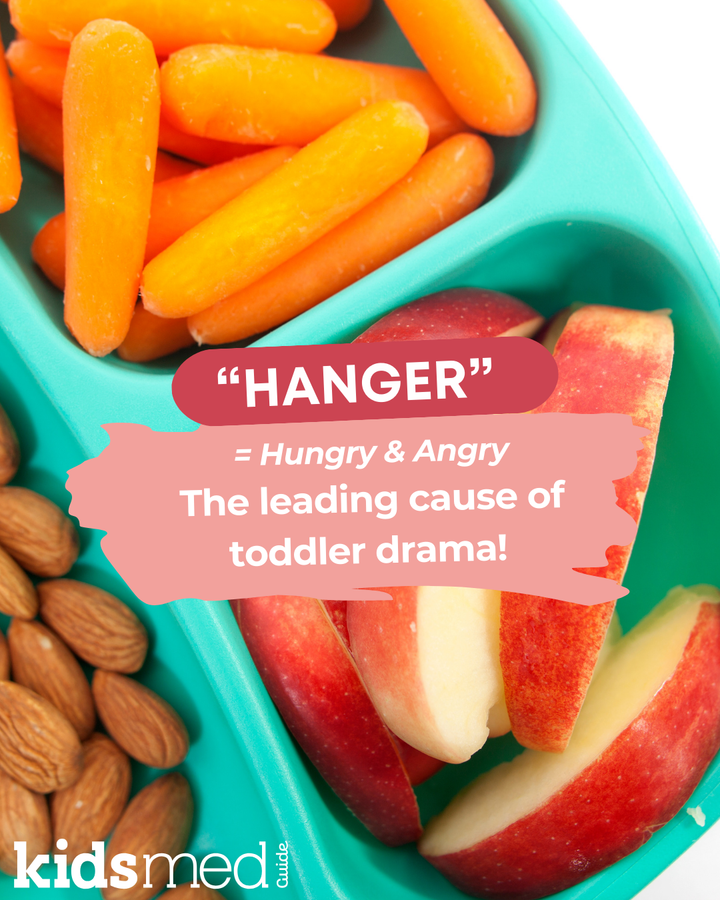Nutritional Supplements for Kids in Sports: What Parents Should Know

Nutritional supplements are everywhere. You can find them at any pharmacy, grocery store, or specialty nutrition shop. There are online stores and affiliate links all over, along with more content creators recommending their favorite brands than you can count!
Why Children Might Need Sports Nutrition Supplements
Active kids burn more energy and may need more calories during growth spurts or athletic competitions. Like adult athletes, children may need to increase their calorie intake and focus on consuming complex carbohydrates and protein. It's tempting to reach for a supplement to help.
But the first step is always food first! Instead of using a supplement, focus on the following:
- Complex carbohydrates from whole grains, fruits, vegetables, beans, and dairy help keep glycogen stores ready for practice and games.
- Healthy fats from fish, avocados, nuts, seeds, olive oil, and dairy support vitamin absorption and provide a sustained energy source.
- Lean proteins from poultry, fish, dairy products, eggs, tofu, and beans support repair and growth.
Supplements can be helpful in specific cases, such as when a doctor identifies deficiencies in iron, B vitamins, calcium, or vitamin D, or when they are medically recommended for a particular condition.
Medical experts and pediatric groups advise against the routine use of supplements in children for athletic performance.

Popular Nutritional Supplements for Young Athletes
Protein supplements for children
Protein is essential, but most children get enough through their meals and snacks. Athletes should focus on consuming high-quality protein foods after practice and games.
Multiple pediatric and sports reviews advise against the routine use of children’s protein supplements, cautioning that protein powder for kids is generally unnecessary for performance.
It is possible to have too much protein! Supplementing runs the risk of kidney damage and other health issues. It's difficult for a child to "overdo" it on protein from food alone, but adding in supplements increases the risk of unwanted side effects.
Furthermore, protein supplements are usually not studied in children unless they are prescribed for a diagnosed medical condition. The vast majority of protein powders and other related supplements are intended for adults.
If you're considering it for convenience, consult your pediatrician first and use it sparingly as a supplement, focusing on food sources first.
Practical post-activity foods include options such as Greek yogurt with fruit and nuts, a chicken sandwich on whole-grain bread, turkey wraps, chocolate milk, trail mix, hard-boiled eggs with fruit or veggies, hummus and whole-grain pita, or a smoothie made with yogurt, fruit, and nut butter.

Vitamins and minerals
Key micronutrients for young athletes include iron, calcium, B vitamins, and vitamin D. These are typically obtained through the diet, with supplements considered only if a clinician detects a deficiency and prescribes a specific dose and duration.
Iron and vitamin deficiencies can impact some athletes, and in many cases, supplementation becomes necessary. It should be overseen by a healthcare provider, and screening and treatment must be customized for each individual.
Hydration and electrolytes
Water is the main way to stay hydrated during most practices and games, and hydration is often overlooked! Active kids should drink plenty of water each day. Urine should be light yellow to clear; this is usually a good sign that they are getting enough water. Dark yellow urine means they aren't getting enough.
Sports drinks can be helpful during long or very intense activity, especially in heat or humidity, but they are not necessary for typical, shorter sessions.
Sports drinks should generally be reserved for workouts lasting an hour or more, or for highly intense activities. When choosing them, select lower-sugar options and use them during and immediately after the athletic event (not all day or during periods of rest).
Always avoid giving kids energy drinks with caffeine or other stimulants – they are unnecessary and can be harmful.
Tips for Using Nutritional Supplements Safely
- Start with balanced meals. Focus on whole foods and regular meals and snacks that include a balance of carbs, protein, and healthy fats.
- Consult a registered dietitian or nutritionist if you want to optimize nutrition for a young athlete.
- Time your fueling. A balanced, protein-rich snack eaten within 30 to 60 minutes after activity promotes recovery; hydration and healthy eating should continue throughout the day.
- See your pediatrician before giving your child any supplement. Consider supplements only if your child has a proven deficiency or specific medical requirement.
- Stay label-savvy. If a healthcare professional recommends a product, choose a simple formula with low added sugars and consider reputable, third-party tested brands. Don't use caffeine or other stimulants.
- Remember that most nutritional supplements and protein powders are not tested in children. Additionally, they are not regulated by the FDA and do not have to prove their safety or effectiveness to be sold to the public.
Supporting Young Athletes Beyond Nutrition
Sleep, rest days, and time off for schoolwork and unstructured fun are just as important! Focus on growth, health, and play. Hydration is important every day and can be monitored with simple cues like urine color and routine drinking before, during, and after activity.
Conclusion
Help your athlete perform at their best with whole-food nutrition, adequate hydration, sufficient sleep, and supportive coaching. Kids’ sports nutrition supplements should not be a regular part of training. Nutritional and protein supplements should only be used in children under the guidance of a pediatrician if there is a clear medical need.
Frequently Asked Questions
What are the best protein supplements for children?
Prioritize food first. If your clinician suggests a supplement for a health reason, choose a simple, low-sugar option from a reputable brand. Routine children’s protein supplements are not recommended for athletic performance in youth.
Can supplements replace meals for young athletes?
No, supplements cannot substitute the nutrition, fiber, and overall advantages of balanced meals and snacks. Use them only to address specific deficiencies under medical supervision.
Are children’s sports nutrition supplements safe?
Many supplements are designed for adults and have limited research on under-18 populations. Expert bodies advise against their use for performance in teens. Talk to your pediatrician about any product.
How much protein does a child need for sports?
Needs differ based on age, size, and activity level, and most kids meet them through food. Effective practice tips include spreading protein throughout meals and snacks and adding a post-exercise option. Your pediatrician or a sports dietitian can customize goals.
Can vitamin supplements improve athletic performance?
Vitamin and mineral supplements are meant for treating deficiencies, not for increasing speed or strength. Concentrate on a balanced diet and consult your healthcare provider before beginning any supplement.
The following references were used to compile this information:
4 Nutritional Guidelines for Young Athletes | Boston Children’s Health Physicians. (n.d.). Retrieved September 24, 2025, from https://bchp.childrenshospital.org/news/4-nutritional-guidelines-young-athletes
Fueling your adolescent athlete | HPRC. (n.d.). Retrieved September 24, 2025, from https://www.hprc-online.org/social-fitness/family-optimization/fueling-your-adolescent-athlete
Hecht, C., Bank, N., Cook, B., & Mistovich, R. J. (2023). Nutritional Recommendations for the Young Athlete. Journal of the Pediatric Orthopaedic Society of North America, 5(1), 599. https://doi.org/10.55275/JPOSNA-2023-599
Nutrition and Supplement Use (Care of the Young Athlete). (2021). Pediatric Patient Education. https://doi.org/10.1542/peo_document566



